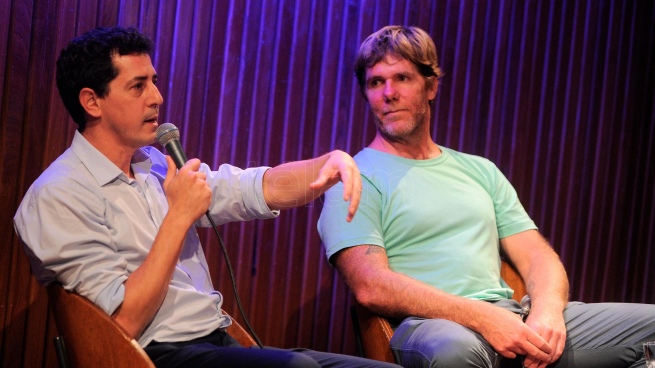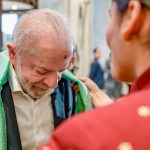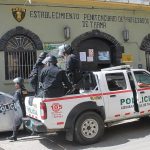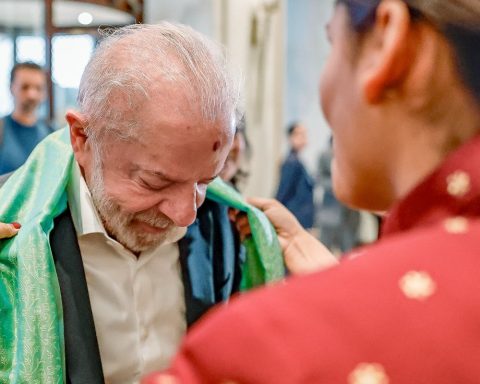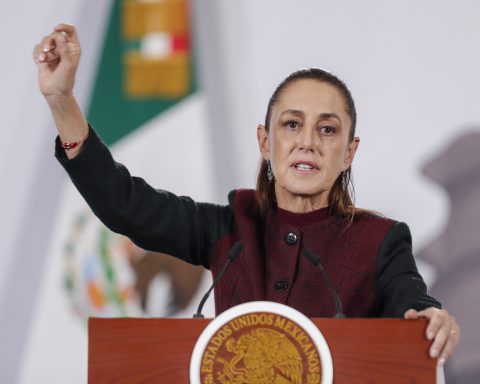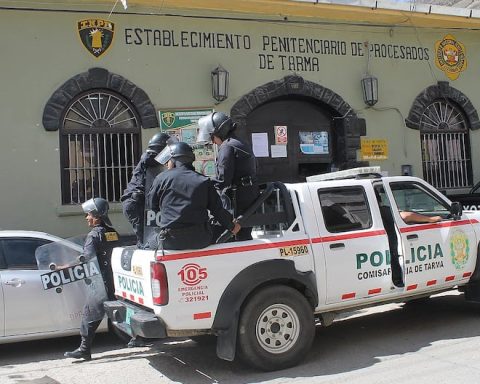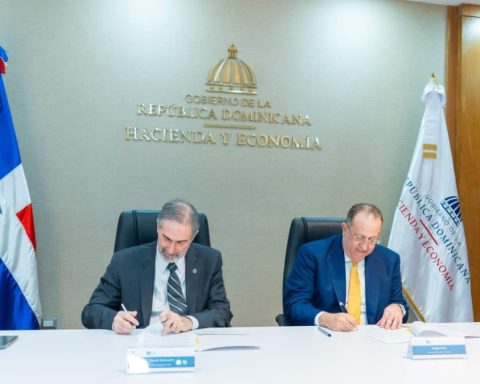within hours of completion 46 years since the last military civic coupJorge Areta, son of the poet Joaquin Aretaarrested and disappeared during the 1978 World Cup, presented his book “The Poet’s Son” at the National Library, accompanied by the Minister of the Interior Eduardo “Wado” DePedro who, moved and with his wife and daughter among the attendees, congratulated the author “for his courage” in telling “one of his truths” in this book.
“Memory is not something static, it is being assembled from all this that we build. From the poetic sample of memory that is below, from this presentation, from tomorrow’s march here and in Mar del Plata,” said Areta, who edited previously two books by his father, while on this occasion he has just published his own. The exhibition to which he referred is “Hijxs. Poéticas de la memoria”, which investigates the artistic production of the generation of the children of the disappeared and can be seen at the National Library with free admission.
The author and De Pedro presented the work in a kind of living room that was set up on the stage with two armchairs and a coffee table, and the event was also part of poetry week, whose worldwide celebration day is March 21.

Among her father’s poems that Areta edited is “I want you to remember me”which was read by the former president Nestor Kirchner in 2005, within the framework of the Book Fair of that year, when the work “Palabra Viva” was presented, a compilation of texts by writers who disappeared during the military dictatorship. The video of the former president reading that poem was shared many times after his death on social networks, tributes and commemorative events.
In the Jorge Luis Borges auditorium and in an emotional and informal atmosphere, the author explained that he had summoned the current Minister of the Interior, son of Enrique De Pedro – who was active in the JP and Montoneros and was assassinated by the Army – and Lucila Révora, who was eight months pregnant, was kidnapped from her home on October 11, 1978 by a task force and arrived lifeless at the clandestine detention center known as El Olimpo, because she was “a pride” and she admired him.
“Why Wada? It is a pride. admiration is mine. It is not something that happens to me with all the children of the disappeared, but it does happen with some. I have been quite inorganic in my military way because it is also a way of putting myself in another place than the militants of the 70s. That was my way: not being organic, “said Areta.

The author said that they met with De Pedro in SONS but he was always “in the background” and she recalled that the first time she saw him speaking on television she felt “a very strong identification”. “I cried and cried. That’s why Wado, thank you,” he told the former national deputy.
Areta said that she was publishing this book now because she needed to find “that honesty so intimate that what one writes is nourished by. Always go there and that is why now is always a good time to let things go and to be honest with one”.
For his part, De Pedro thanked the call to participate in the presentation and confessed that he had not read a poetry book for a long time: “(Mario) Benedetti must have been the last one, back in ’97.”
“I want to congratulate you for your courage, I liked being able to accompany you on this day”manifested and said that like Areta, he was also “lucky” to have his father’s companions who “were building the bridge, the bridge that one lacked: the presence of the father, gestures, things.”
In this context, De Pedro stressed that when he approached the military in HIJOS “there was a very nice explosion of memory” and he spent “a month or two reading a lot, everything he was collecting and analyzing what was happening at that time” .
“The way I found to get everything that was happening to me was a notebook full of that catharsis where one dumps a lot of things that are very strong for the other, for the other. And maybe he also dumps it on a piece of paper so that it doesn’t go away, to have it there,” he emphasized.
The Interior Minister said that “these processes have to do with the search, with resolving processes, with history and Argentina that lead to moving forward with enthusiasm, to slow down, to have doubts.” And he maintained: “We are that too. We are people who constantly fight with that search of ‘being the children of’. Being 45 years old implies a search, a decision, it implies a very strong desire for what we do and it is very good to have had doubts, if what we do is mandated or not, if we are doing something because it is similar to what our old people did or We’re just alike.”
At the end, De Pedro read one of the poems from the book “The Poet’s Son”: El Oficio.
“What’s Happening Lately
with my profession as a poet
I have to walk
stopping
to cry everywhere
breaking me every time
thinking backwards
looking on the sides
to
keep walking”.
